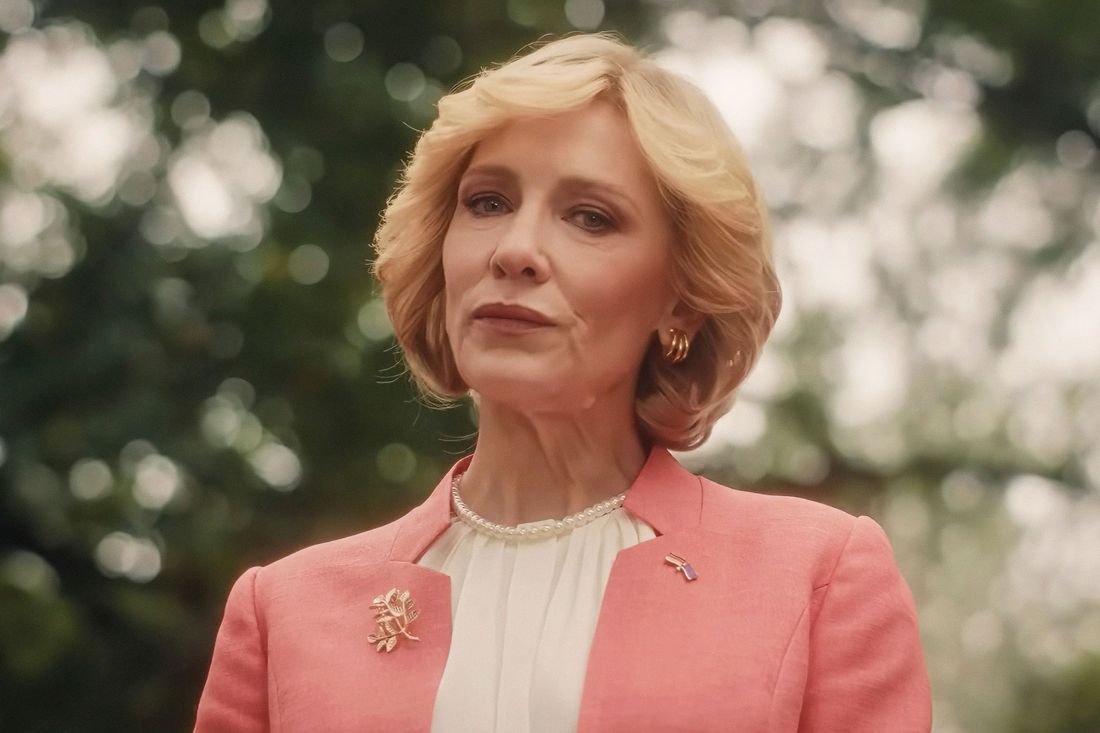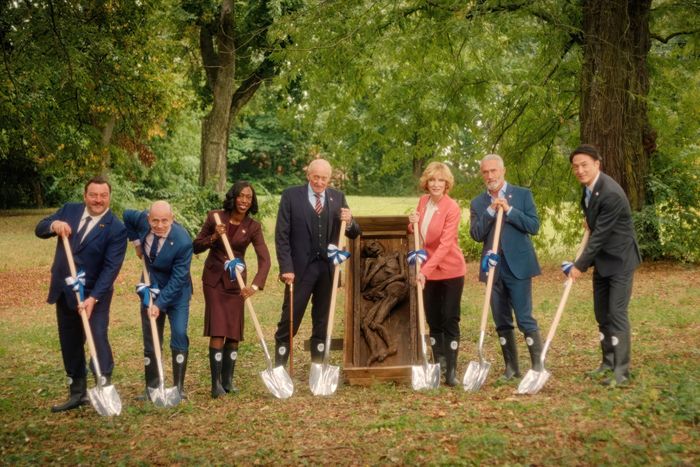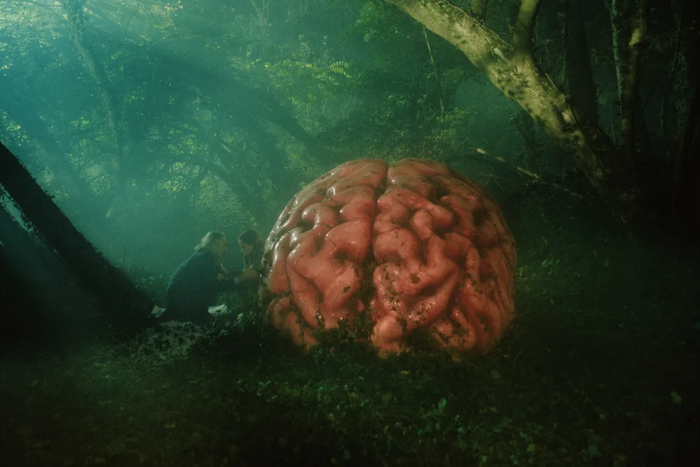
Cate Blanchett might be one of the world’s great actresses and a huge movie star, but she’s also not one to shy away from the perverse and experimental. With her starring role in Rumours, directed by Canadian filmmaking legend Guy Maddin and his regular collaborators Galen and Evan Johnson, she’s made one of her strangest and funniest pictures to date. It’s a stylized and self-aware satire set during a G7 summit hosted by the German prime minister (played by Blanchett); things go horribly and hilariously wrong when these leaders of the world’s most advanced economies find themselves lost in a primeval forest and are set upon by onanist bog-men, Scandinavian witches, and a giant glowing brain, as well as their own petty, childish regrets. Though full of wild humor, the movie does build to something deeper: a despairing portrait of our political leaders’ inability to deal with the world’s existential crises. And while Rumours represents one of Maddin’s more mainstream pictures, it’s still unlike any other film in living memory. A huge fan of the director, Blanchett was itching to work with him and the Johnsons. She describes the trio of directors as akin to “an amoeba” and says she’d work with them again in a heartbeat.
How on Earth did you end up making a movie with Guy Maddin?
I was an enormous fan of Guy’s. I’ve been speaking to Ari Aster about one thing and another. He called one day and said, “Guy and Evan and Galen have this script,” and would I read it? I’d seen The Green Fog, which is a movie that I think every single film student should watch. So, I went, “Yeah, of course.” And I just loved the script. I love their irreverent take on things. They’re so deliberately perverse. Just when you think they might be tackling a serious subject, they run in the opposite direction. I thought it was a really great way of dealing with global anxiety and the monumental failure of leadership, through their lens.
So many conceptually offbeat comedies will build up a head of comic steam and then fall apart. The concept might be very funny, but they struggle to maintain the energy or take things to another level. Rumours, I felt, didn’t let up at all. It got funnier and funnier and more existentially terrifying as it went along.
“Existentially terrifying” is probably something they should put on the poster. I mean, it’s part monster movie, part Mexican soap opera, part Douglas Sirk. And something that we constantly referred to was Buñuel’s Exterminating Angel, so it’s part fever dream in a way. I love the fact that it’s a difficult film to describe, but that’s what makes it extraordinary. People are so ready to put things into boxes. And Guy in particular, in his long and varied underground, backroom career, has remained continually curious about the way he makes films. As a result, it’s so utterly particular. You’d ask them what something meant, and it was almost like those questions are an anathema to them. There’s an internal logic to their films, but they also defy logic, so they’re silly and deep simultaneously.
The masturbating bog men, for example.
It’s a good name for a punk band. The Masturbating Bog Men.
It’s a metaphor that works in a variety of ways. On the one hand, they are these very physical, immediate, raw forces that almost point out the shallowness of what the G7 leaders are doing …
Yes. Or maybe the alter egos of leaders gone by.
And at the same time, they’re kind of just wanking along while the politicians give speeches.
Right! Yes. Yes. Yes.
I love the fact that this symbol can go in all of these directions. It opens up a variety of possibilities for the film.
I love that each of these G7s have a theme, and this one is regret. Several of the leaders are getting ready to step down, and so there’s a kind of profound melancholy and looking back over their collective relationships and the contracts that only they can understand. And the theme of regret almost leads to these bog bodies being exhumed. Do they represent unexamined colonial history, or inaction on climate change, all of these things that they haven’t exhumed before now come to consume them?
The return of the repressed?
Yeah. But as soon as it starts to become a theme, the filmmakers will literally cut the film and run in the opposite direction.
In your case, you have the accent and everything …
An accent of sorts. I mean, the whole thing is a kind of a parody.
What’s the difference between a comedy accent and a drama accent?
I don’t know. You tell me. These things sort of evolved. I was the only one who was not playing someone from a different country, apart from Charles Dance.
He’s playing the U.S. president, but he’s got a British accent, which is hilarious.
There used to be an explanation as to why he had a British accent. Somebody that the filmmakers knew in their childhood had gone away to England for a time and come back with an English accent. So, a lot of these references make personal sense to them, but they don’t feel the need to explain them or justify them to an audience. So that was cut out.
In your case, though, the comic accent, you can play around with it.
I think there’s so much license in their films, because they set up a logical premise and then they set fire to it. You have to find the right place to sit, to ground it, but then also be able to explode that reality, hopefully.
What does that mean when it comes to shooting the film? Is there a lot of improvisation happening, or flying by the seat of the pants?
Oh, we were definitely flying by the seat of our burning underwear! But they’re quite meticulous. I was surprised that Evan and Galen and Guy wanted a table read. We did have a couple of days round the table to nut things out, because we had to move so quickly and it was all shot at night, which I hadn’t really computed. I really did expect to be shooting this in Guy’s garage in Winnipeg, which I was quite excited by. As freewheeling as their films feel, they are quite meticulous as screenplay writers. They were quite clear about what they wanted said, and what they wanted to see.
All these characters have histories, personal histories in some cases. So often, when you have to build a part, you have to create a backstory for a character. But is that something you do for a weird comedy like this?
Not really. In the same way that you probably wouldn’t for The Exterminating Angel, because it disintegrates so quickly and you become your id, or you become all of the artificial trappings that go into making a world leader. Which we see so awkwardly expressed in footage from these G7 summits. I mean, they are excruciatingly awkward, and these people are so far away from anything that resembles reality, it’s a parody in and of itself — they go through all these cultural moments and when they talk, you can see that they’ve been coached in gestural language that is powerful but non-threatening. There’s a puppetry to it. So, in the film, in a way they regress into becoming human, to becoming terrified. It was also interesting that the filmmakers were deliberately playing with cultural stereotypes, but even then they were completely unmoored. In a way, all of that stuff had to be found between the actors on set.
So, how did you find them?
How did we find them? I don’t know if I did. These things are elusive. It was great. I mean, everyone always says this, but it was literally like being on an extended sleepover for six weeks. All of us spent time in this sort of little, tiny easy-up tent. There were no trailers or anything, and we just sat around in silence. Then someone would say, “Anyone want a nut bar? Can I make a coffee?” And Rolando would bring in meat and cheese —
Sort of like his character in the film, the Italian prime minister. What is it like being directed by three people?
You see a lot of pairings of people making films together. In a way, it’s a bit like the old studio system where people would always work with the same producer, who had their back, who would challenge them, but also give them the limitations that they needed, because unfettered access to resources is not necessarily the most creative way to work, as Guy’s work would attest to. I didn’t realize at first that they came as a triple bill. I thought it was just Guy. But I’m so grateful that the three of them were there. And it’s a product of the three of them. When people say this is a Guy Maddin film — it’s very much made by the three of them.
Initially, I thought, How is this going to work? Who do I speak to? And the way it worked out was that I would ask Guy the big, thematic questions, and he’d go, “Huh? Hmm. The answer is I don’t know.” And then two days later, he would come back, having deeply thought about the question, and he would give you the thesis on why, in a way that could be actioned. I mean, we’re not making The Mahabharata here, you know? And then Evan was really practical — really clear, quite blunt. Then Galen was sort of like this strange, technical puppet master in the background. The way they worked together was so fluid and fantastic. Because often there’s a lot of pressure on directors. It’s not the most creative way to work — because you can’t be in real time, be present, but also future-thinking, necessarily. I’d be curious to see where the three of them go together. I would work with them again in a heartbeat.
They’re like a collective brain, it seems.
They’re an amoeba.
Those of us familiar with the world of international diplomacy will get some of the finer points of the comedy — all the nonsense about working papers and the protocol and stuff. But was there ever a concern that some of the humor in the film might go over the heads of those unfamiliar with, say, what the G7 even is?
I think probably it’s a more accessible film than many films that Guy has made in the past. And I don’t think you really need to understand the intricacies of the G7 in order to get the absurdity. But it helps. The film is dealing with archetypes, and with an existential human problem — the idea of talking about things rather than doing something about them — so there’s something timeless about it.
But the power of the work that they’ve done together, the three of them, is that a film is not necessarily successful when it’s found in the moment. I didn’t find Guy’s films at the time they were made, necessarily. I watched My Winnipeg several years after it had come out, and then I went backwards over his oeuvre, and I realized just how influential he had been on the way people felt they could play with and subvert narrative and the texture of film. What I relished and loved about working with him is the interconnection between the theatrical experience and the cinematic experience that Guy so often plays with. So, I think that people will find it, and they might find it this year, or they might find it five, ten, 15 years hence.
Was My Winnipeg your first Guy Maddin film?
Was it? I can’t remember. I think I’d seen the film he made with Isabella Rossellini, The Saddest Music in the World. Beautiful. And “The Final Derriere,” the song that Sparks did for them, I knew. But his tastes are so eclectic. His tastes in film and music are so eclectic. He has an eclectic bunch of friends, and he loves his dog and Winnipeg as much as he loves world cinema. He’s such a strange and wonderful mix of confidence and surety and absolute, profound anxiety-ridden uncertainty. He’s able to hold both of those stakes in his films. So, there’s a febrile quality to the way he works. But he’s so open-hearted, and he cares so deeply.
Is there a film that you’ve done over the years that you wish more people had appreciated?
Gosh, I can’t think of one offhand. I forget what I’ve made as soon as I’ve made it. Sometimes you can have a great time making something, but the actual product doesn’t connect with people at the time. There are certainly some films I’ve made which I’d like to forget. I do worry at the moment that there is so much stuff — and I say stuff — being made that it is so difficult to wade through it all to actually find something, and to allow the ripples of that experience to live long enough before you’re meant to consume something else. It feels like we’re living through a cinematic or televisual La Grande Bouffe. My instinct is to do less and to be quiet, and to go back onstage.
So, maybe some things I’ve done onstage, I would love people to have seen. Because it’s ephemeral. A Streetcar Named Desire, that we did with Liv Ullmann. Gross und Klein, which Benedict Andrews directed, I was really proud of. And The Secret River, which we ended up taking to the National Theatre, which I was very proud of, and Uncle Vanya. Maybe those things I think about more in that way, because they are so ephemeral. But that’s the gift of theater. You have to be present and there, and it lives on in people’s memories.




